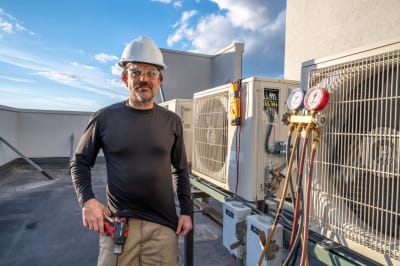Choosing a training school for plumbers in Boston, Massachusetts, should be a pretty straightforward process, yet it is usually a task that many struggle with. The problem is not that there aren’t options in and around the area to choose from, but that it can be overwhelming sorting through the array of options.
To simplify this decision, we have provided a list below containing the most notable programs for plumbers in and around Boston, Massachusetts. All entries on the list below have been narrowed down thanks to their superiority in education quality, the effectiveness of their coursework, and the relative proficiency/experience of their instructors, among other criteria.
How to Become a Plumber in Boston
Becoming a plumber in Boston, Massachusetts, often involves choosing between a formal training program at a college/vocational school or an apprenticeship program offered by trade unions, organizations, government initiatives, and approved companies.
To enroll, candidates must usually have at least a high school diploma or GED. Some programs also ask that candidates should be at least 18 years old.
After training, the next important question is licensure. Plumbers in Boston must obtain at least a journeyman license before they can work professionally. From there, they can pursue a master plumber license after at least one year of experience on the job.
The Massachusetts Division of Professional Licensure licenses plumbers at all levels.
Top Plumbing Technician Schools in Boston, Massachusetts
Now that we’ve examined the general steps required to become a plumber in Boston, here are some of the most popular training programs in and around the city.
Benjamin Franklin Institute of Technology
Boston, MA Online + Campus
The Benjamin Franklin Institute of Technology remains one of the oldest colleges in New England, having been established as far back as 1908. The school boasts some of the state's best engineering and industrial technology career programs.
Email: admissions@franklincummings.edu
Tuition
$610 - $650 per CreditContact
(877) 400-2348
Email in Bio
The Peterson School
Woburn, MA Online + Campus
The Peterson School is another high-quality training destination for plumbers in and around Boston. Not only do students get to enjoy the introductory courses that will help them get certified, but they can also participate in continuing education classes geared towards keeping professionals updated on the advancements of techniques and tools in the field.
Email: woburnadmin@petersonschool.com
Tuition
$7,800 - $8,200 per ProgramContact
(781) 938-5656
Email in Bio
The Plumbing Academy, Inc
Middleton, MA Online + Campus
Training at The Plumbing Academy takes place online with highly flexible and self-paced courses. Those who opt for the journeyman plumbing courses must complete 6800 hours of hands-on training and 550 hours of classroom instructions.
Tuition
$1,400 - $1,500 per ProgramContact
(978) 620-5880
info@theplumbingacademy.com
Tri-County Regional Vocational Technical School
Franklin, MA Online + Campus
Plumbers training at the Tri-County Regional Vocational Technical School learns about the fundamentals of piping systems for hot and cold water, fixtures and pumps, corrosive fluids, and drainage systems, among others.
Tuition
$8,395 - $14,465 per YearContact
(508) 528-5400
munger@tri-county.us
Plumbers Local 12 Training Center
Boston, MA Campus Only
Plumbers Local 12 Training Center offers one of the best apprenticeship training programs for plumbers in and around Boston. Students here get to receive advanced training from master plumbers to have everything they need to become journeyman plumbers.
Tuition
FreeContact
(617) 288-6200
info@local12training.org
Explore nearby states for training and education:
Explore detailed steps and the state’s licensing requirements:





